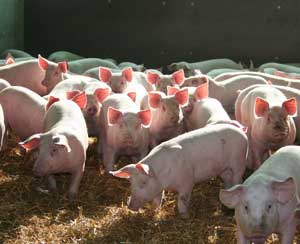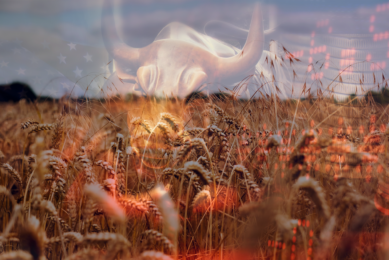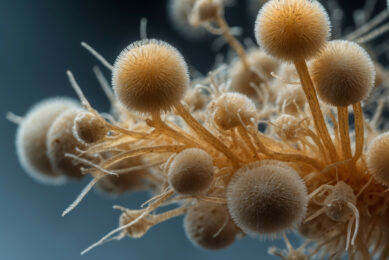Versatility of enzyme contributes in reducing pig production costs

Over a 100 trials achieved in experimental facilities or in field conditions, have proven that a multi-enzyme solution increases nutrient digestibility of diets for piglets and growing pigs allowing for lower feed costs. In lactating sows it reduces weight loss allowing for better performances. The added value of Rovabio is subsequent: savings from $5 to $10 per tonne for feed and an extra $28 per sow per year.
By Caroline Joos, marketing manager Rovabio, Adisseo, France
All nutrients are positively affected by NSP enzyme addition in pig diets, but Rovabio, which is a versatile enzyme of Adisseo is effective on a large range of raw materials, thanks to its combination of 19 fully-compatible enzyme activities (xylanases, β-glucanases, cellulases, pectinase, etc). The enzyme complex has been tested in more than 100 trials globally. Among these, a recent trial conducted on 24 cannulated pigs in Adisseo’s facilities at CERN in France, shows that energy digestibility is increased by 1.4% on wheat, 2.8% on barley and 3.8% on dried distillers grains. Digestibility of nitrogen was also significantly increased (+4.9% on average).
Adisseo’s database confirms that the multi-enzyme is effective in piglets and in pigs, “with generally higher effects on piglets” says Pierre Cozannet, who is an enzyme researcher specialised in swine nutrition for Adisseo. A synthesis of trials shows that, compared with a control diet without enzyme, Rovabio increases average daily gain (ADG) with 5.4% and lowers feed conversion ratio (FCR) with 3.6% for piglets, and respectively +4.3% for ADG and –1.5% for FCR for growing pigs.
As a result of its large spectrum of enzymes activities, a multi-enzyme performs on a wide range of substrates. This is the reason why trials with pigs fed on wheat/corn/barley/ soybean meal/peas/DDGS based diets always lead to better performances. Through digestibility and growth trials the potential of the enzyme complex was evaluated on all major raw materials. For example, the Net Energy of a corn-based diet for fattening pigs is increased by 50kcal/kg when using the multi-enzyme with an increase of protein level by 1.6g/kg. The matrix values of Rovabio at 50g/t in a formulation software for this specific diet would be 700,000kcal/kg of net energy and 31,500g/kg of protein (each per kg of Rovabio). In more complex diets, it is recommended to apply uplift in the formulation on each single ingredient (barley, wheat bran, peas, etc.). The feed costs savings will range between $5 and $10 per tonne of feed depending on raw material prices and availability (Table 1).
NSP enzymes are largely used in poultry feed to reduce feed cost. This opportunity is about to become a common practice for pig feed also. All this data has been obtained through a wide research program achieved over several years by a team of Adisseo’s experts in swine nutrition, in specific facilities in France (CERN, Commentry) and universities throughout the world.
Uniform animals and better carcass quality
In addition to improved performances, in most trials, piglets and pigs supplemented with a multi-enzyme in their diet showed uniformity in body weight, which contributes to reduced time between batches and/or ensure a proper clean downtime. In a piglet trial run in France, piglets fed diet with Rovabio were 0.7kg heavier than piglets receiving a control diet. Moreover, standard deviation decreased by 16%, proving the effect of the enzyme on homogeneity of the batch, with two days gained between batches. (Figure 1)
In a recent Brazilian trial with Rovabio Max (a combination of the multienzyme and phytase) in pigs, animals fed on a diet with the enzyme complex demonstrated a lower back fat thickness of the carcass with more carcasses rated premium.
Additional benefits in piglets
Besides having a positive effect on nutrient digestibility, Pierre Dalibard, Adisseo’s global technical manager, explains some extra benefits from the enzyme complex on piglet gut health. “It has been shown that Rovabio increases villi length and improves crypt depth for all sections of the gut. On average villi length increased with 4.7% in the jejunum and 14.1% in the ileum. Crypt depth improved by 6.3% in the mid jejunum up to +23% in the proximal jejunum.”
Increased villi length and crypt depth ratios improve absorption capacity of nutrients. More recent studies also show that Rovabio has a probiotic effect thanks to more substrate available for positive bacteria population. This could explain in part how a multi-enzyme contributes to better gut health of piglets and less diarrhoea, as shown in trials achieved in CERN and in Sichuan University, with a reduced diarrhoea occurrence by 7.2% to 27.8%, depending on conditions and digestive problem incidences (Figure 2).
Reduced weight loss in lactating sows
The multi-enzyme is not only efficient with piglets and pigs, but also in sows which “must not be considered as adult pigs, given that their reproductive and digestive functions are in competition,” says Dalibard. Six trials throughout the world, concerning more than 500 sows, with different genetics, feed compositions, ages at weaning, showed on average that weight loss can be reduced during lactation by more than 3kg, and back fat thickness loss by 24% from farrowing to weaning. The effect of a multi-enzyme is even greater on sows losing more than 10kg.
Such efficiency has been demonstrated in high NSP diets (wheat/barley) as well as in low NSP diets (corn). These results can be explained by a greater feed intake during lactation and better nutrient utilisation. The advantage is therefore decreased tissue mobilisation, with positive consequences on reproductive performances of sows.
Today, we accept from the field that a reduction of 0.2 total born piglets occurs for each mm of back fat loss if back fat loss is higher than 2mm during lactation, the critical point. A reduction of back fat loss by 24% with enzymes in the diet from 4mm to 3mm would lead to an extra 0.2 total piglets born in the subsequent litter. Following a calculation from IFIP (the French Pork and Pig Institute) this would generate an extra $28 per sow per year. To pass this benefit on Adisseo has submitted a dossier to the European authorities to extend its approval to a 7th application of Rovabio on lactating sows for the EU market.
[Source: Enzyme special]











